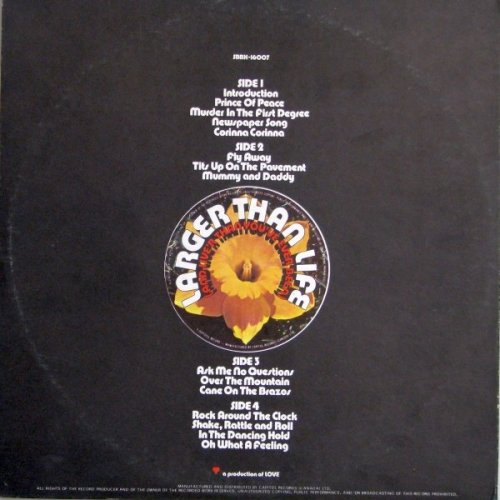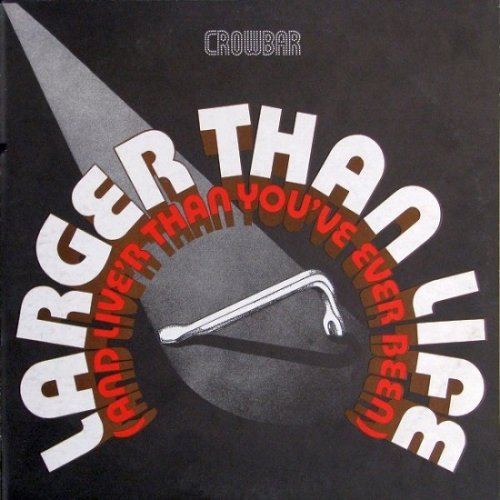
Crowbar - Larger Than Life (1972)
BAND/ARTIST: Crowbar
- Title: Larger Than Life
- Year Of Release: 1972
- Label: Daffodil Records
- Genre: Blues Rock
- Quality: Mp3 320 / Flac (tracks)
- Total Time: 01:08:45
- Total Size: 168/409 Mb
- WebSite: Album Preview

Tracklist:
01. Introduction
02. Prince of Peace
03. Murder in the First Degree
04. Newspaper Song
05. Corrina, Corrina
06. Fly Away
07. Tits Up on the Pavement
08. Mummy & Daddy
09. Ask Me No Questions
10. Over the Mountain
11. Cane On the Brazos
12. Rock Around the Clock
13. Shake, Rattle and Roll
14. Oh What a Feeling
Crowbar's roots can be traced back almost as far back as Roly Greenway's career. Greenway first played guitar in The Centurys (1958) who were based in Guelph and featured Ed Dameron (bass), Rick Cassolato (drums), Glenn Higgins (sax) and another unidentified drummer. Greenway would then go on to perform in Joe Pino & The Starlites (1962), and The Ascots (1963). It was in the Ascots that he met guitarist Rheal Lanthier and the two played the Vegas lounge circuit for two years with the likes of Liberace and Zsa Zsa Gabor. The band broke up from sheer boredom and returned to Canada where Greenway joined Bobby Curtola's touring band.
In 1967, Greenway reformed the band with Lanthier as the New Ascot Revue where they recruited Kelly Jay, piano player/vocalist, and world renowned harmonica player Richard Newell aka King Biscuit Boy. Newell had gotten his nickname during his tenure playing on and off with Ronnie Hawkins. Hawkins had asked Newell to assemble a new band so he grabbed the New Ascots plus Richard Bell (keyboards), John Gibbard (guitar) and Larry Atamaniuk (drums) to create the latest version of Hawkins' band called ...And Many Others.
Hawkins took the band to some of the most prestigious venues in rock including the Filmore East playing on a bill with the likes of Joe Cocker, Johnny Winter, and Mountain. However, as was Hawkins' unpredictability, in 1970 while at the Grange Tavern in Hamilton, Hawkins came into the bar and fired the whole band exclaiming: "You guys are so crazy you could f*ck up a crowbar in three seconds!". And thus a band, and a band name, was born.
The act resumed with a slight personnel change - Sonnie Bernardi replaced Atamaniuk on drums and Jozef Chirowski replaced Bell on keyboards. Along with King Biscuit Boy, Crowbar cut the 'Official Music' album on credit from Terry Brown and Doug Riley's Toronto Sound production facility. It was the first Daffodil Records release July 13, 1970. Critics were unanimous in their appraisal of the band. The ensemble toured with their most memorable performance at the Strawberry Fields Rock Festival near Toronto in the summer of 1970. In late 1970, King Biscuit Boy and Crowbar parted ways - he to write material for the 'Gooduns' album; they to prepare for the debut album 'Bad Manors'.
Within three months, the international release of the album again garnered critical acclaim from magazines such as Creem and Rolling Stone. Crowbar was the first act to launch a record in the legislation era (a law designating the implementation of 30% mandatory Canadian content by all radio stations) with the single "Oh, What A Feeling".
The song was also featured on the live album recorded at Massey Hall, 'Larger Than Life', which was certified gold within 3 weeks of its release. Unfortunately, due to the drug connotation to lyrics in "Oh, What A Feeling", the tune failed to gain airplay in the United States. It did do well in England, however.
As part of Pierre Trudeau's bid to gain the youth vote, his wife Margaret Trudeau (who was a Crowbar fan) asked the band to become the opening act of Trudeau's re-election campaign in 1972. With rallies in such venues as Maple Leaf Gardens, Trudeau won the campaign and Crowbar became a household name. However, their popularity also spawned the need to incorporate and hire industry people to handle their affairs under the management of Martin Onrot.
While Daffodil Records was negotiating a new distribution with A & M Records, Crowbar was lured away by Clive Davis to join Columbia Records in New York and signed to their affiliate Epic Records. Their debut album for the label, 'Million Dollar Weekend', was produced by Jack Richardson (Guess Who) fledgling production apprentices Jack Douglas and Bob Ezrin.
A second album for Epic was released in 1974, but the failure to have any sizable commercial success led the band to officially split up later that year.
After several years in other personal projects, the members re-united (with the exception of Chirowski who had joined the Alice Cooper Band) with two new members - Ray Harrison (keyboards) and Rick Birkett (bass) - for a winter tour in 1977-78 following which the band split up once more. Kelly Jay would go on to have an intermittent solo career; Roly Greenway was in the band Next briefly in 1976; Ray Harrison co-founded Shooter who released one album on GRT.
Fast forward to 1996 and the original Crowbar reunited without Kelly Jay for some good time revival shows. With Kelly Jay flying in for gigs in recent years, Crowbar occasionally plays event shows when they can.
In 1967, Greenway reformed the band with Lanthier as the New Ascot Revue where they recruited Kelly Jay, piano player/vocalist, and world renowned harmonica player Richard Newell aka King Biscuit Boy. Newell had gotten his nickname during his tenure playing on and off with Ronnie Hawkins. Hawkins had asked Newell to assemble a new band so he grabbed the New Ascots plus Richard Bell (keyboards), John Gibbard (guitar) and Larry Atamaniuk (drums) to create the latest version of Hawkins' band called ...And Many Others.
Hawkins took the band to some of the most prestigious venues in rock including the Filmore East playing on a bill with the likes of Joe Cocker, Johnny Winter, and Mountain. However, as was Hawkins' unpredictability, in 1970 while at the Grange Tavern in Hamilton, Hawkins came into the bar and fired the whole band exclaiming: "You guys are so crazy you could f*ck up a crowbar in three seconds!". And thus a band, and a band name, was born.
The act resumed with a slight personnel change - Sonnie Bernardi replaced Atamaniuk on drums and Jozef Chirowski replaced Bell on keyboards. Along with King Biscuit Boy, Crowbar cut the 'Official Music' album on credit from Terry Brown and Doug Riley's Toronto Sound production facility. It was the first Daffodil Records release July 13, 1970. Critics were unanimous in their appraisal of the band. The ensemble toured with their most memorable performance at the Strawberry Fields Rock Festival near Toronto in the summer of 1970. In late 1970, King Biscuit Boy and Crowbar parted ways - he to write material for the 'Gooduns' album; they to prepare for the debut album 'Bad Manors'.
Within three months, the international release of the album again garnered critical acclaim from magazines such as Creem and Rolling Stone. Crowbar was the first act to launch a record in the legislation era (a law designating the implementation of 30% mandatory Canadian content by all radio stations) with the single "Oh, What A Feeling".
The song was also featured on the live album recorded at Massey Hall, 'Larger Than Life', which was certified gold within 3 weeks of its release. Unfortunately, due to the drug connotation to lyrics in "Oh, What A Feeling", the tune failed to gain airplay in the United States. It did do well in England, however.
As part of Pierre Trudeau's bid to gain the youth vote, his wife Margaret Trudeau (who was a Crowbar fan) asked the band to become the opening act of Trudeau's re-election campaign in 1972. With rallies in such venues as Maple Leaf Gardens, Trudeau won the campaign and Crowbar became a household name. However, their popularity also spawned the need to incorporate and hire industry people to handle their affairs under the management of Martin Onrot.
While Daffodil Records was negotiating a new distribution with A & M Records, Crowbar was lured away by Clive Davis to join Columbia Records in New York and signed to their affiliate Epic Records. Their debut album for the label, 'Million Dollar Weekend', was produced by Jack Richardson (Guess Who) fledgling production apprentices Jack Douglas and Bob Ezrin.
A second album for Epic was released in 1974, but the failure to have any sizable commercial success led the band to officially split up later that year.
After several years in other personal projects, the members re-united (with the exception of Chirowski who had joined the Alice Cooper Band) with two new members - Ray Harrison (keyboards) and Rick Birkett (bass) - for a winter tour in 1977-78 following which the band split up once more. Kelly Jay would go on to have an intermittent solo career; Roly Greenway was in the band Next briefly in 1976; Ray Harrison co-founded Shooter who released one album on GRT.
Fast forward to 1996 and the original Crowbar reunited without Kelly Jay for some good time revival shows. With Kelly Jay flying in for gigs in recent years, Crowbar occasionally plays event shows when they can.
Blues | Oldies | Rock | FLAC / APE | Mp3
As a ISRA.CLOUD's PREMIUM member you will have the following benefits:
- Unlimited high speed downloads
- Download directly without waiting time
- Unlimited parallel downloads
- Support for download accelerators
- No advertising
- Resume broken downloads


